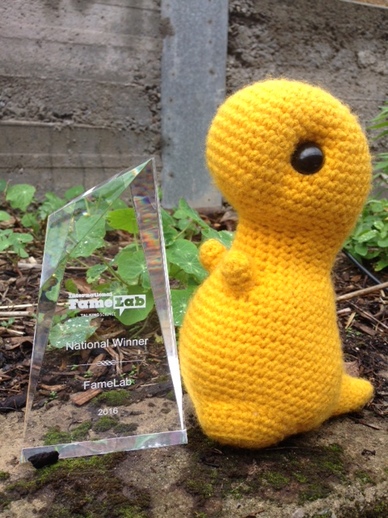FAMELAB!
It's been a while since Mustard and I wrote a blog post! But we haven't left our PhD in a burning pile of notes and pipette tips... we've just been slack in writing.
One of the most exciting things we've done in the past couple of months is take part in a science communication competition called FameLab. It's an international competition run by The British Council where you have to explain your science in 3 minutes of talking (no powerpoint slides!) in a way that anyone could understand it.
It all started when a friend forwarded me the email calling for applications. “I think you should totally enter it and show the joy of dead caterpillars”, he wrote. Why not? I thought. I can talk, and it beats doing more PCRs right now!
To apply for Famelab you had to make a 3 minute video of yourself talking about your PhD thesis. I recorded mine on my super duper iphone camera (read: really old iphone camera) in the lab to make it look more ‘sciency’, just in case that would help… I decided it looked more professional than filming it in my lounge room, anyway. I got through the semi-finals, but since there were so few applicants from Adelaide, we were flown to Perth to compete in the Western Australian semi-finals.
Writing the talk was so much harder than I thought it would be. I’ve done a reasonable amount of science communication in my time, but I didn’t realise how very different talking about your own science would be, compared to, for example, explaining why bicarbonate soda and vinegar react and cause a film canister to explode… the sci-com-outreachers reading will get me! It’s a totally different kettle of fish (or wasps in this case) explaining your own science, and I think it’s because all the jargon, all the intimate words and phrases and meanings that you literally speak all day to your office-mates and colleagues and supervisors are so ingrained. I found it really quite difficult to take a step back and think… ‘do people know the word gene? Will they know what I’m talking about if I say DNA? Do most people know that wasps undergo metamorphism like a butterfly does? Do most people even know what metamorphism is?’
In the end I had a fun talk written and had a blast meeting the semifinalists in Perth and making the audience boo the evil caterpillar in our superhero story. Whilst I didn’t win a place in the semifinals, I was selected as one of the British Council’s wild card entries to go through to the national finals. So back to Perth with a refreshed talk I went, and again had fun with a really cool audience in one of the nicest buildings I’ve had the pleasure to present in – The Western Australian Museum. If you have three minutes to spare and want to be grossed out, you can listen to my national final winning talk here!
So yes, I was hugely honoured to be chosen by the judges as the Australian winner – there were some absolutely amazing talks that night, and I’m still not sure how on earth the judges would have made a decision. Winning the finals meant that I was rewarded with a trip to the UK to compete in the international famelab competition. The international competition takes place as part of the Cheltenham Science Festival, and there were 27 countries competing. Meeting 26 other young scientists from all over the world, all so passionate about science communication and sharing their joy of science was the most amazing experience. Thanks to the modern inventions of social media, I hope to stay in touch with these inspiring people for many years to come.
The international competition was broken up into semifinals, from which we were selected to go through to the final event the next evening. The catch? You had to have a talk ‘significantly different in content’ for the next night, so I chose to talk about my honours work on the stygofauna (animals which live in underground water) in the Pilbara of Western Australia. The three winners of the international final were the loveliest people and gave brilliant talks – and it was a pleasure to stand alongside them and entertain, educate and inspire an audience for a few hours.
I can’t thank the British Council enough for the chance to head overseas to the international competition, and for continuing to support the training of PhD students as science communicators here in Australia. So if you’re a PhD candidate and talking about your science gets you bright eyed and bushy tailed, think about applying for Famelab next year- trust me, you won’t regret it!

 RSS Feed
RSS Feed
